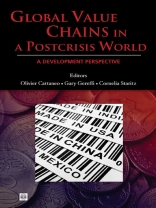For the first time since World War II, global output will drop (-1.7%); per capita income will fall in more than 50 developing countries; net private capital flows will likely turn negative – a more than $700 billion drop from the 2007 peak; and trade is expected to decline by 6.1% in 2009 – the worst decline in 80 years. In response to this global downturn, a number of governments have passed stimulus packages and other measures that aim to preserve domestic industries and jobs, and sometimes discriminate against foreign producers (e.g. "buy local" laws). The most recent forecasts announce a re-bound of trade in 2010 (+3.8%) and 2011 (+6.9%), primarily driven by developing countries.All three elements (dropping demand on major markets, policy responses to the crisis, and developing countries-led recovery) potentially have significant implications for global production, trade, and value chains. How have lead firms responded? Have they changed their traditional supply chain strategy and relocated and/or outsourced part of their production? How will those changes affect developing countries? What should be the policy responses to these changes? How to best prepare developing countries for recovery and integration in the new global production chains?
Olivier Cattaneo & Gary Gereffi
Global Value Chains in a Postcrisis World [EPUB ebook]
A Development Perspective
Global Value Chains in a Postcrisis World [EPUB ebook]
A Development Perspective
قم بشراء هذا الكتاب الإلكتروني واحصل على كتاب آخر مجانًا!
لغة الإنجليزية ● شكل EPUB ● ISBN 9780821385036 ● الناشر The World Bank ● نشرت 2010 ● للتحميل 3 مرات ● دقة EUR ● هوية شخصية 5845559 ● حماية النسخ Adobe DRM
يتطلب قارئ الكتاب الاليكتروني قادرة DRM












